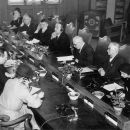2nd International Henryk Wieniawski Violin Competition
Poznań, 5-16 December 1952
Watch a documentary about the competition:
It was a sheer stroke of luck! In late-summer of 1952 preparations held in Warsaw to revive the International Henryk Wieniawski Violin Competition after the World War II break collapsed. There was simply no place to hold the event. A number of lesser-destroyed towns immediately declared their help. It was probably the suggestion made by Tadeusz Szeligowski, a resident of Poznań, previously appointed Chairman of the Competition’s jury, that prevailed: on 23 September, the provincial authorities adopted a relevant resolution and sent a letter to the Minister of Arts and Culture, in which he was asked to “accede to the request made on behalf of the citizens of Poznań...” On 11 November, the minister did eventually accede and informed that he had designated Poznań to become “the p e r m a n e n t seat to international violin competitions...”, which by no means meant that he himself abandoned the role of their ultimate host. The Competition Secretariat was affiliated with the Ministry, and it was only its Office that opened in Poznań. A permit to make the Lubrański Hall, another venue, besides the University Auditorium, available for the purposes of the Competition, had to come from the Deputy Minister of Higher Education. It would take hours to discuss in the capital how to adorn Poznań for the occasion, who was going to show foreigners round the town, and what to show them, as well as where in the jury proceedings hall to place “a coffee-machine and sweets stand”. Meanwhile, the application list for the competition grew shorter by the day. “Capitalist countries deny their participation in the Competition — informed the Ministry for Foreign Affairs — quoting trifling reasons intended to hide the real ones”. What were the real reasons? In its report, the Secretariat does not reveal any. Instead, we learn that “in the current situation the Jury of the Competition shall be composed of representatives of people’s democracies”. It was also recommended that guests should be selected from among “progressive critics and musicologists from England, France, Italy, Sweden, Belgium and Germany...”. The West did not so much boycott, as ignored such offers; e.g. despite being issued official invitations, none of the three Americans, incl. Sydney Harth (!), arrived. Even Bulgarians wanted to cancel their participation, due to “climatic differences, which might adversely affect the instruments”
Fortunately, the organizers in Poznań did not loose their heads. The team, gathered around the Competition Office, which was headed by the Director of the Philharmonic, Zdzisław Śliwiński, enthusiastically and competently did what was necessary to receive the Competition. Interest of music-lovers was immense. The orchestra, conducted by Stanisław Wisłocki and Jan Krenz, ran intense rehearsals. The Auditorium was cleaned, and the old “Bazar” Hotel furnished with extra equipment, for it lacked not only bathrooms: there was not a single radio in the building (!).
On the night of 2 December 1952, a special train from Warsaw pulled up at Poznań’s Central Station. It brought the participants, members of the jury, and the central organizing committee of the Second Wieniawski Competiton; a competition that was never to leave the town. It is a jewel, one of the most valuable gems of the national culture; it serves the whole musical world, and, excellently improved and developed by the inhabitants of Poznań, is the town’s pride and showpiece.
source: R. Połczyński, Da Capo. 75 lat Międzynarodowych Konkursów im. Henryka Wieniawskiego
Read more about the 2nd Competition (PDF, 780 KB) >

A poster of 2nd edition of Wieniawski Violin Competition designed by A. Sopoćko.
JURY
MEMBERS
Chairman: Tadeusz Szeligowski (Poland)
Jacques Thibaud (France
)
Wladimir Awramow (Bulgaria)
Grażyna Bacewicz (Poland)
Gerhard Bosse (GDR)
Dmitrij Cyganow (USSR)
František Daniel (Czechoslovakia)
Irena Dubiska (Poland
)
André Gertler (Belgium)
Zdzisław Górzyński (Poland)
Zdzisław Jahnke (Poland)
Józef Jarzębski (Poland
)
Helene Jourdan–Morhange (France)
Grigorij Orwid
(USSR)
Eugenia Umińska (Poland)
Oscar Wagner (Austria
)
Tadeusz Wroński (Poland)
Eda
Zathureczky (Hungary)
PRIZE WINNERS
1st prize: Igor OISTRAKH
(USSR)
2nd prize: Julian
SITKOVETSKY (USSR), Wanda
WIŁKOMIRSKA (Poland
)
3rd prize: Blanche TARJUS
(France), Marina YASHVILI (USSR), Olga
PARKHOMENKO (USSR)
4th prize: Emil KAMILAROV
(Bulgaria), Edward
STATKIEWICZ (Poland), Igor IWANOW
(Poland), Henryk PALULIS
(Poland)
5th prize: Csaba BOKAY (Hungary)
Awards: Marta Hidy (Hungary); Ladislav Jásek (Czechoslovakia); Homi Kanga (India); Kalman Banyák (Hungary)























